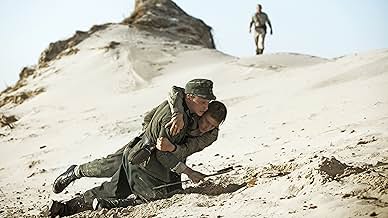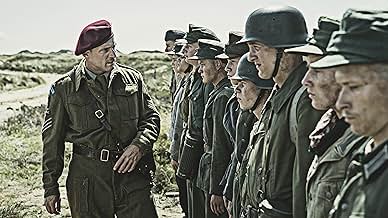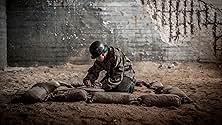In post-World War II Denmark, a group of young German POWs are forced to clear a beach of thousands of land mines under the watch of a Danish Sergeant who slowly learns to appreciate their p... Read allIn post-World War II Denmark, a group of young German POWs are forced to clear a beach of thousands of land mines under the watch of a Danish Sergeant who slowly learns to appreciate their plight.In post-World War II Denmark, a group of young German POWs are forced to clear a beach of thousands of land mines under the watch of a Danish Sergeant who slowly learns to appreciate their plight.
- Nominated for 1 Oscar
- 33 wins & 27 nominations total
Zoe Zandvliet
- Elisabeth, Karins Daughter
- (as Zoé Zandvliet)
Max Beck
- August Kluger
- (as Maximilian Beck)
- Director
- Writer
- All cast & crew
- Production, box office & more at IMDbPro
Storyline
Did you know
- TriviaThe actors were trained in mine clearance 'anno 1945' at the Military Training Compound 'Oksbøl.' During training, they found a 'live' mine that had been there for 70+ years--and it was in fine working condition. The mine was removed and disarmed by the Danish de-mining experts.
- GoofsThey are mainly clearing Anti-Tank mines, and indeed mention this in the dialogue. However, Anti-Tank mines are designed to not be triggered by a person's weight, so troops can cross them without them going off--so that they are still in place and active when armored vehicles in support of the troops ultimately cross the same path as the troops. Anti-Tank mines need several tons of pressure to activate. In the film, they are treated like eggshells.
- Quotes
Lt. Ebbe Jensen: If they are old enough to go to war, they are old enough to clean up.
- ConnectionsFeatured in La noche de...: La noche de... Bajo la arena (2021)
Featured review
In matters of war, no nation is free of guilt. Regardless of whether they are produced by victorious or vanquished countries, the better war films set out facts, acknowledge wrongdoing, express regret, and seek atonement. Many of them put guilt and culpability onto the widescreen so that current and future generations may learn from the past. This is the psychological space in which we find the extraordinary Danish-German war film Land of Mine (2016).
It is 1945 and the war is over, but the beautiful Danish coastline has two million deadly mines left buried in the sand by the Nazi occupation. Danish Sergeant Carl Rasmussen (Roland Møller) is assigned a squad of fourteen German prisoners of war who must clear a beach that contains 45,000 active mines. The Sergeant's treatment of the teenage boys is initially brutal: they live and work in terrible conditions, are practically starved and constantly reminded that everyone in Denmark hates them and nobody cares if they live or die. Their task is to crawl along the beach by hand, poking a stick in the sand to locate mines, then defuse them before they explode. Inevitably, many failed. With echoes of Stockholm syndrome, both captor and captives find glimpses of humanity in each other that leads to Rasmussen being suspected by his tormenting superiors of going soft on the Germans. He must walk the fine line between military obedience, personal hatred of Nazis, and his growing compassion and realisation that these are just boys who were conscripted into battle. His characterisation and its transition from hatred to acceptance frames the narrative of this high-tension drama.
Stunningly realistic cinematography with minute attention to detail amplifies the horror of this story. The acting is remarkable from a mostly unknown cast and Rasmussen's performance captures the very essence of moral conflict. The mine-clearing proceeds inch-by-agonising-inch, and the film's plot line inches forward at a similar pace. With camera at sand-level, we see close-up images of teenage warriors with beads of terror trickling down their faces as their sand-covered fingers slowly un-screw a detonator from a mine, knowing that an explosion will tear their body to pieces. These are some of the most heart-pulse racing moments you can experience through film. This is not entertainment nor is it for faint-hearted viewers; several scenes are horrific.
Most war films glorify battle or corner us into cheering one side or the other. This film presents an exquisite conundrum: was it morally acceptable for the Danish military to force German POWs to remove the deadly mines that the Nazi army left behind, knowing that most will die or be maimed? Or should this deadly work have been carried out by Danish soldiers? Was the inhumane treatment of teenage soldiers justifiable, regardless of the brutality of the Nazi occupation of Denmark? In the light of such questions, is this film one of justification or a confessional that seeks atonement? Land of Mine shines a bright light on what has hitherto been a dark secret of Danish history. It is a powerful and important story.
It is 1945 and the war is over, but the beautiful Danish coastline has two million deadly mines left buried in the sand by the Nazi occupation. Danish Sergeant Carl Rasmussen (Roland Møller) is assigned a squad of fourteen German prisoners of war who must clear a beach that contains 45,000 active mines. The Sergeant's treatment of the teenage boys is initially brutal: they live and work in terrible conditions, are practically starved and constantly reminded that everyone in Denmark hates them and nobody cares if they live or die. Their task is to crawl along the beach by hand, poking a stick in the sand to locate mines, then defuse them before they explode. Inevitably, many failed. With echoes of Stockholm syndrome, both captor and captives find glimpses of humanity in each other that leads to Rasmussen being suspected by his tormenting superiors of going soft on the Germans. He must walk the fine line between military obedience, personal hatred of Nazis, and his growing compassion and realisation that these are just boys who were conscripted into battle. His characterisation and its transition from hatred to acceptance frames the narrative of this high-tension drama.
Stunningly realistic cinematography with minute attention to detail amplifies the horror of this story. The acting is remarkable from a mostly unknown cast and Rasmussen's performance captures the very essence of moral conflict. The mine-clearing proceeds inch-by-agonising-inch, and the film's plot line inches forward at a similar pace. With camera at sand-level, we see close-up images of teenage warriors with beads of terror trickling down their faces as their sand-covered fingers slowly un-screw a detonator from a mine, knowing that an explosion will tear their body to pieces. These are some of the most heart-pulse racing moments you can experience through film. This is not entertainment nor is it for faint-hearted viewers; several scenes are horrific.
Most war films glorify battle or corner us into cheering one side or the other. This film presents an exquisite conundrum: was it morally acceptable for the Danish military to force German POWs to remove the deadly mines that the Nazi army left behind, knowing that most will die or be maimed? Or should this deadly work have been carried out by Danish soldiers? Was the inhumane treatment of teenage soldiers justifiable, regardless of the brutality of the Nazi occupation of Denmark? In the light of such questions, is this film one of justification or a confessional that seeks atonement? Land of Mine shines a bright light on what has hitherto been a dark secret of Danish history. It is a powerful and important story.
- CineMuseFilms
- Mar 28, 2017
- Permalink
- How long is Land of Mine?Powered by Alexa
Details
- Release date
- Countries of origin
- Official sites
- Languages
- Also known as
- Mảnh Đất Của Tôi
- Filming locations
- Production companies
- See more company credits at IMDbPro
Box office
- Budget
- DKK 35,500,000 (estimated)
- Gross US & Canada
- $435,266
- Gross worldwide
- $3,169,553
Contribute to this page
Suggest an edit or add missing content

































